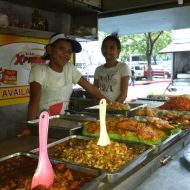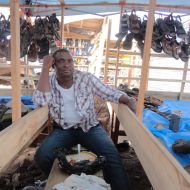Pride in Local Brews Helps Homemade Beers Become a Smash Hit
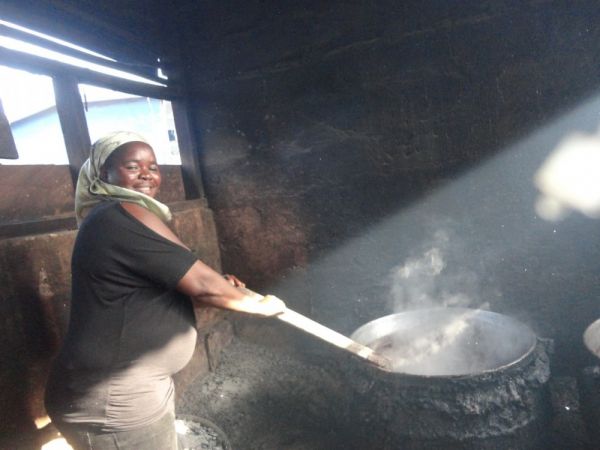
Margaret Agbana mixes up her concoction.
You’d be forgiven for thinking, at first glance, that you’d walked into some kind of fairy-tale witch’s lair. Three huge metal cauldrons – the only word to describe them – bubble ominously over blazing wood fires in a back room. The hot, still twilight is pierced by a single shaft of light. Metal and plastic containers are heaped with strange ingredients. An unfamiliar but pleasant odor hangs in the air, wafting out of the small, low cement building.
But Margaret Agbana’s appearance – she’s a round, beaming woman – quickly banishes any hint of the occult. What she and her daughter Fatima are making here aren’t potions, but a simple and beloved local beer called pito. They explain the process to me: Millet is simmered for several hours over the fires, then poured into barrels to ferment. Drunk the same day it’s made, it is a sweet, almost fruity-tasting low-alcohol-content drink called tui asi. But left to ferment overnight, the drink gets stronger, maturing to a slightly higher-alcohol-content drink called burukutu. Margaret and her family distribute their daily three barrels to drinking spots around the city, as far as neighboring Tema.
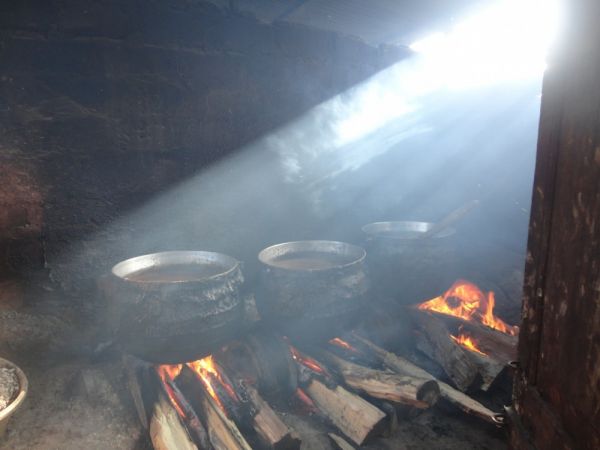
Pito brewing over an open flame.
They’ve been running their tiny brewery in the heart of Agogbloshie for years, though they only moved into this particular space last year. Agogbloshie is a low-income community near the center of Accra, surrounded by agricultural trade, a timber market, Makola Market, the “refugee” community of Old Fadama and the infamous e-waste processing site. Agogbloshie itself is small and rather tight-knit. Though it’s poor, without gutters or pavement, it feels like a bit of an oasis from the chaos surrounding it.
Around the corner at a small drinking spot, a few men are starting their weekends a bit early, enjoying bowls – actually hollowed-out half calabashes – of pito on a Friday afternoon. Pito has a long history among the other famous alcoholic beverages of Africa, almost exclusively home-brewed and sold at small informal or semi-formal drinking spots. Pito is an import to Accra; in Ghana it’s mostly Northerners who have historically consumed it. But the Northerners have been coming to Accra for years, and they’ve brought their traditions. The name of the little spot, Bolga Pito, alludes to its origins; Bolgatanga is the capital of the northeastern Upper East Region. The music blaring from the sound system is also Northern, and the men there fall into a debate about the quality of Northern music and the ability of foreigners like me to appreciate it.
The view from the bar where they’re drinking is of railway tracks, a wall and stacks of crates. Traders are lined up along the sides of the tracks, spillover from Kantamanto Market. “You should see this place on Sundays!” they tell me. “Everyone dancing! The whole place fiiiiilled,” gesturing down the length of the tracks.
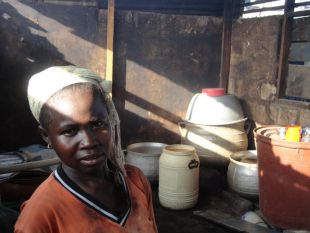
Margaret’s daughter, Fatima.
I want to try the less-strong version of pito, tui asi, so the men at the spot call over a woman walking down the tracks carrying an array of plastic bottles on her head. “This is Africa beeee-eer!” she sings, tipping a hefty serving into a calabash. This stirs a wave of agreement among my drinking companions. “This drink is for us, for our forefathers,” one says proudly. Another echoes, “This is my local drink. African beer, this.”
These men are obviously connoisseurs. Like wine experts debating tannins, they discuss in detail the brewing process, the various ways to drink pito. They review the wonderful properties traditionally ascribed to it: Aiding the treatment of malaria, for example. It’s also cheap – my full calabash costs one Ghana cedi (about 50 cents).
It is this local spirit, and the demand from the low-income market, that beverage companies have tapped into with new lines that borrow specifically from indigenous brews and spirits. Kasapreko, a Ghanaian liquor company, has been making drinks like akpeteshie, a local sugar-cane spirit, at a large scale and selling them cheaply and in small quantities. You can buy little plastic shot-sized packets of the drinks for pesewas.
Similarly, Accra Brewery, a subsidiary of SABMiller, has gotten into the local drinks market. The brick walls and plastic crates you can see from my Agogbloshie drinking spot make up the backside of its large Accra-based operation. Just three years ago, Accra Brewery started making a maize-and-sorghum beer similar to pito, called Chibuku, for this market. Its bright blue branding and “Shake Shake” slogan were emblazoned on several drinking spots I saw in Agogbloshie. My local friends tell me that the Fra Fra people from Nvrongo in northern Ghana are the originators of this drink. In fact, according to Ben Afakey, Operations Director at Accra Brewery, varieties of these opaque beers are found all over Africa, but primarily in southern Africa.
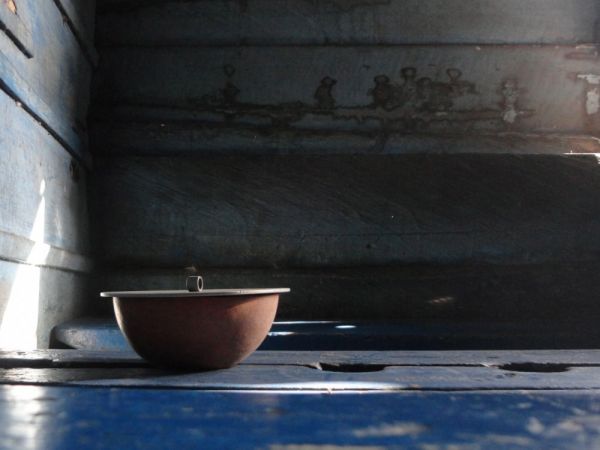
A calabash of pito.
The company’s production of Chibuku has grown steadily since its introduction in 2009, from 1,000 liters per day to 100,000 liters now, testament to a demand for low-cost locally inspired drinks. It’s a logistically complex process. Like pito, the drink is unpasteurized and ferments naturally over time, growing stronger and less sweet over a few days. So it’s packaged in specially designed cartons with vents to prevent the otherwise inevitable explosions of a sealed fermenting brew. The product has a five-day shelf life, so the company works closely with retail outlets directly. They started with just four outlets, but now there are five hundred, all of which must be managed with the same care. All this careful management has confined the product to Accra for now, but they plan to expand. They have worked on building a supply chain exclusively with small-scale Ghanaian farmers to use inputs that are entirely local.
It’s targeted at the low-income market specifically, so you won’t find it outside communities like Agogbloshie. At 1.20 Ghana cedis for a one liter carton, it compares very favorably against Club, their flagship standard beer, which typically retails at nearly three times that price for just over half a liter. Two other low-price beers – Chairman, a malt beer, and Eagle, a cassava based beer – also target this large market. Accra Brewery’s competitor, Guinness, also recently launched a cassava beer, Ruut.
At least one nightclub in Accra is doing the exact opposite: Bringing local drinks to the middle- and high-income markets more used to Western beers. The Republic Bar, run by local brothers Raja and Kofi Owusu-Ansah, has created sophisticated cocktails all based on akpeteshie. You can’t get a gin and tonic there, but you can get a killer frozen cocktail called the Frozen Harmattan, with crushed ice, coconut, lime, sugar, mint… and akpeteshie.
This kind of thing seems to be in the air as more people celebrate and refine their indigenous products. A friend of mine, a recent returnee, recently told me, eyes shining, “Have you ever tried pito? I want to build a pito brewery. A really big one.” He has a few other things on his mind for the next few years though. So Margaret and Fatima can breathe easy, for now. Or maybe they’ll be his competition.
Photos by Sharon Benzoni




